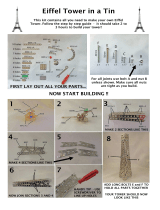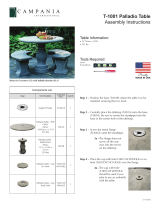
Burj Khalifa
Dubai, United Arab Emirates
Booklet available on:
Livret disponible sur:
Folleto disponible en:
Architecture.LEGO.com
21008_BI.indd 1 02/03/2011 4:21 PM

BurjKhalifa
Described as both a ‘Vertical City’ and ‘A Living Wonder,’ Burj
Khalifa, at the heart of downtown Dubai, is also the world’s
tallest building.
Developed by Dubai-based Emaar Properties PJSC,
Burj Khalifa rises gracefully from the desert and honors
the city with its extraordinary union of art, engineering and
meticulous craftsmanship.
At 828 meters (2,716.5 feet), the equivalent of a 200
story building, Burj Khalifa has 160 habitable levels, the most
of any building in the world. The tower was inaugurated on
January 4, 2010, to coincide with the fourth anniversary of
the Accession Day of His Highness Sheikh Mohammed Bin
Rashid Al Maktoum Vice President and Prime Minister of
the UAE and Ruler of Dubai.
Arguably the world’s most interesting construction
project, Burj Khalifa is responsible for a number of world-firsts.
The tower became the world’s tallest man-made structure
just 1,325 days after excavation work started in January 2004.
Burj Khalifa utilized a record-breaking 330,000 cubic
meters (430,000 cubic yards) of concrete;
© Emaar Properties PJSC
2
21008_BI.indd 2 08/03/2011 6:32 PM

39,000 tons of steel reinforcement; 103,000 square meters
(1.1 million square feet) of glass; and 15,500 square meters
(167,000 square feet) of embossed stainless steel. The tower
took 22 million man-hours to build.
With a total built-up area of 526,000 square
meters (5.67 million square feet), Burj Khalifa features
170,000 square meters (1.85 million square feet)
of residential space, over 28,000 square meters
(300,000 square feet) of office space, with remaining area
occupied by a luxury hotel.
In 2003, as a result of an international design competition,
Skidmore, Owings & Merrill LLP (SOM) was selected from
a group of five international competitors to carry out the
architecture and engineering of the Burj Khalifa.
With famous architecture in the Haj Terminal at Jeddah
Airport and National Commercial Bank, SOM is no stranger
to Middle Eastern design. SOM incorporated patterns and
©EmaarPropertiesPJSC ©EmaarPropertiesPJSC
3
21008_BI.indd 3 08/03/2011 6:30 PM

elements from traditional Islamic architecture, but
the most inspiring muse was a regional desert flower, the
Hymenocallis, whose harmonious structure is one of the
organizing principles of the tower’s design. Three ‘petals’
are arranged in a triangular shape and unified at the center,
and instead of repeated identical patterns, the architectural
plan appoints successively receding and rotated stories.
The Y-shaped plan is ideal for residential and hotel usage,
with the wings allowing maximum outward views and inward
natural light. Viewed from above or from the base, the tips
of the Y-shaped plan evokes the onion domes of Islamic
architecture. During the design process, engineers rotated
the building 120 degrees from its original layout to reduce
stress from prevailing winds.
©EmaarPropertiesPJSC ©EmaarPropertiesPJSC ©EmaarPropertiesPJSC
©EmaarPropertiesPJSC
4
21008_BI.indd 4 08/03/2011 6:30 PM

Architecturally, the building transforms itself from a solid
base expression to a vertically expressed middle section of
polished stainless steel projected metal fins and glass. Only
vertical elements were used here, as the fine dust in Dubai’s
air would build up on any horizontal projecting elements.
©EmaarPropertiesPJSC ©EmaarPropertiesPJSC
5
21008_BI.indd 5 08/03/2011 6:30 PM

To support the unprecedented height of the building,
the engineers developed a new structural system called
the buttressed core, which consists of a hexagonal core
reinforced by three buttresses that form the ‘Y’ shape. Each
wing, with its own high performance concrete corridor walls
and perimeter columns, buttresses the other wings through
a connection to the six-sided central core, or hexagonal
hub. The result is a tower that is exteremly stiff laterally and
torsionally.
Each tier of the building sets back in a spiral stepping
pattern up the building. The setbacks are organized
with the tower’s grid, such that the building stepping is
accomplished by aligning columns above with walls below
to provide a smooth load path. This allows the construction
to proceed without the normal difficulties associated with
column transfers.
The setbacks are organized such that the tower’s width
changes at each setback. The advantage of the stepping
and shaping is to ‘confuse the wind’. The wind vortices are
never allowed to build up because at each new tier the wind
Thestructuralsystem
© Emaar Properties PJSC Rebar construction © Emaar Properties PJSC
Burj Khalifa structural plan.pdf – © SOM
6
21008_BI.indd 6 08/03/2011 6:30 PM

encounters a different building shape.
This structural system enables the building to support itself
laterally and keeps it from twisting.
At the top, the central core emerges and transitions to
a special steel framed structure which is sculpted to form a
finished spire. The spire of Burj Khalifa is composed of more
than 4,000 tons of structural steel.
The building utilizes high-speed, non-stop shuttle
elevators to sky lobby floors where passengers transfer to
local elevators serving the floors in between.
Burj Khalifa has 57 elevators
and 8 escalators. Travelling
at 10 meters/sec (33 feet/
sec) per second, they have
the world’s longest travel
distance from lowest to
highest stop. The building
service/fireman’s elevator
will have a capacity of 5,500
kilograms (12,000 pounds)
and is the world’s tallest
service elevator.
To achieve the greatest
efficiencies, the mechanical,
electrical and plumbing
services for Burj Khalifa
were developed all together
during the design phase of
the tower in cooperation with
the architect, structural
Burj Khalifa wind.jpg – © SOM Inside the high-speed elevator
© Emaar Properties PJSC
© Emaar Properties PJSC
7
21008_BI.indd 7 08/03/2011 6:30 PM

engineers and other consultants. The tower’s water
system supplies an average of 946,000 liters (250,000
gallons) of water daily. At peak cooling, Burj Khalifa will
require about 10,000 tons of cooling, equal to the cooling
capacity provided by about 10,000 tons of melting ice. Dubai’s
hot, humid climate combined with the building’s cooling
requirements creates a significant amount of condensation.
This water is collected and drained in a separate piping system
to a holding tank in the basement car park. The condensate
collection system provides about 57 million liters (15 million
gallons) of supplement water per year, equal to about 20
Olympic-sized swimming pools. The tower’s peak electrical
demand is 50 MVA, equivalent to roughly 500,000 100-watt
light bulbs all operating at the same time.
©EmaarPropertiesPJSC
8
21008_BI.indd 8 08/03/2011 6:30 PM

FactsaboutBurjKhalifa
Location: .......................... Downtown Dubai,
Dubai, United Arab Emirates
Architect:.......................... Skidmore, Owings & Merrill
LLP (SOM)
Building type: ............... Supertall skyscraper
Materials: ......................... Reflective glazing, aluminum
and textured stainless steel
Construction: ................ Reinforced concrete and steel
Date: ................................... From 2004 to 2010
Floor area: ....................... 464,511 m
2
(5.67 million square feet)
Height: ............................... 828 meters (2,716.5 ft.)
Stories: .............................. 160+ stories
©EmaarPropertiesPJSC
9
21008_BI.indd 9 08/03/2011 6:30 PM

With the design and engineering of Burj Khalifa, Skidmore,
Owings & Merrill LLP (SOM), joined forces with Dubai based
developers, Emaar Properties PJSC, to redefine what was
possible with supertall buildings.
With a portfolio that includes some of the most
important architectural accomplishments of the 20th and
21st centuries, including the John Hancock Center and Willis
(formerly Sears) Tower, SOM was perfectly placed to carry
out this challenging task.
To create Burj Khalifa — a building that shatters all
previous height records at 828 meters (2,716.5 feet) — a team of
more than 90 designers and engineers combined cutting edge
technology and culturally-influenced design to create a
global icon that will serve as a model for future urban centers.
Thearchitects
10
21008_BI.indd 10 08/03/2011 6:30 PM

2x
1
4x 1x
2
11
21008_BI.indd 11 08/03/2011 6:30 PM

2x
3
2x
2x
2x
1x
4
12
21008_BI.indd 12 08/03/2011 6:30 PM

1x 1x
5
4x
6
6
13
21008_BI.indd 13 08/03/2011 6:30 PM

5x
7
2x 1x
8
14
21008_BI.indd 14 08/03/2011 6:30 PM

20x
9
The interior is inspired by local
culture while staying mindful of the
building’s status as a global icon and
residence. The design features glass,
stainless steel and polished dark
stones, together with silver travertine
fl ooring, Venetian stucco walls,
handmade rugs and stone fl ooring.
15
21008_BI.indd 15 08/03/2011 6:30 PM

1x
1
2
3x
16
21008_BI.indd 16 08/03/2011 6:30 PM

3x 3x 3x
3
1 2
3x
17
21008_BI.indd 17 08/03/2011 6:30 PM

3x 3x
4
10
10
18
21008_BI.indd 18 08/03/2011 6:30 PM

1x 1x
11
4x 1x
12
11
19
21008_BI.indd 19 08/03/2011 6:30 PM

32x 8x
13
1 2
8x
20
21008_BI.indd 20 08/03/2011 6:30 PM
Page is loading ...
Page is loading ...
Page is loading ...
Page is loading ...
Page is loading ...
Page is loading ...
Page is loading ...
Page is loading ...
Page is loading ...
Page is loading ...
Page is loading ...
Page is loading ...
Page is loading ...
Page is loading ...
Page is loading ...
Page is loading ...
/



